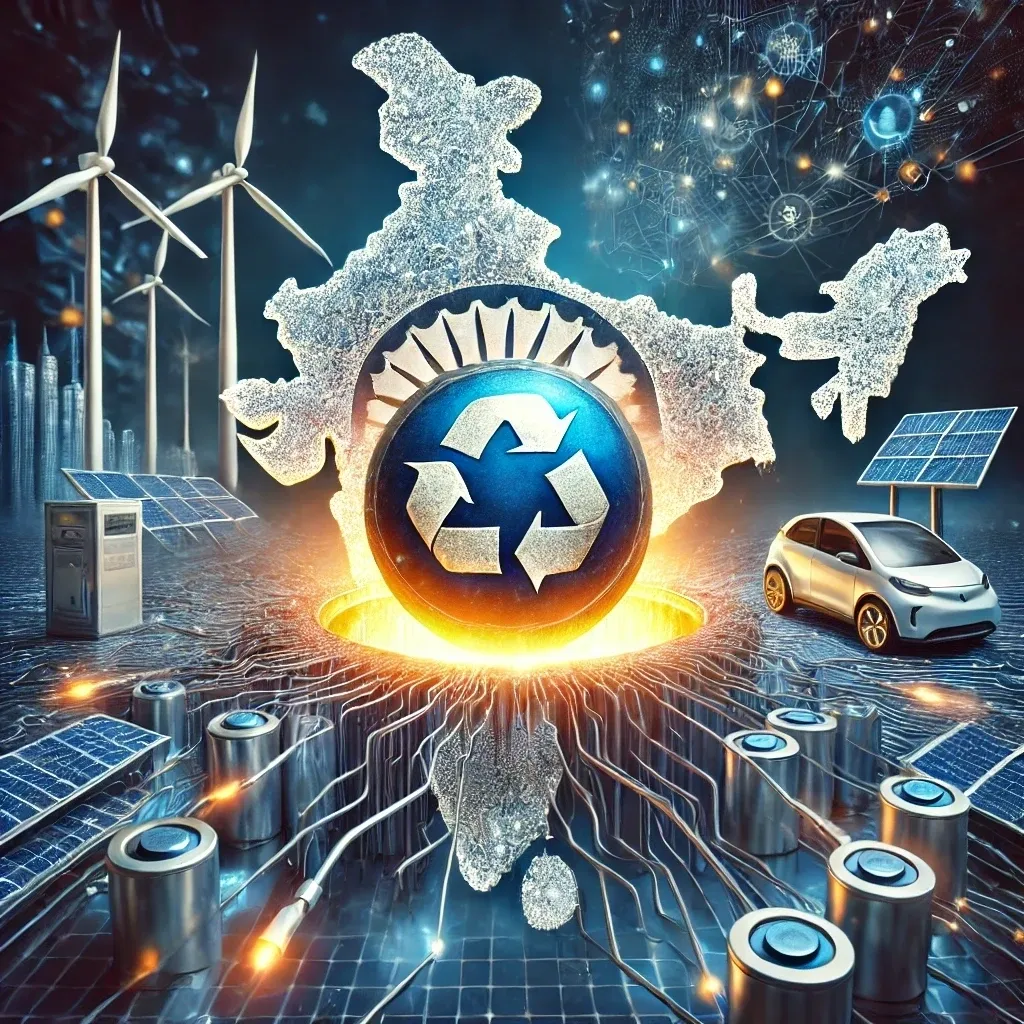India’s ambitious course towards decarbonisation and sustainability has put a continuous spotlight on the significance of cobalt, a vital component of lithium-ion batteries, positioning it as a cornerstone of the nation’s energy transition. With a rapidly expanding electric vehicle (EV) market and a push for renewable energy solutions, India’s energy ambitions are heavily reliant on the secure and stable supply of cobalt. This strategic mineral, while often overshadowed by lithium, is essential for the performance, longevity, and safety of batteries used in electric mobility, renewable energy storage, and various electronics.
Cobalt plays a critical role in stabilising battery chemistry, enhancing energy density, and improving the lifecycle of rechargeable batteries. Around 73% of the world’s cobalt supply is used in lithium-ion battery production, particularly in nickel-cobalt-manganese (NCM) and nickel-cobalt-aluminium (NCA) batteries, both of which are integral to EVs and energy storage systems (ESS).
India’s EV sector, a key driver of the nation’s transition, is forecasted to grow exponentially, with the nation working for EVs to account for 30% of private cars, 70% of commercial vehicles, and 80% of two- and three-wheelers by 2030. However, this transition is inextricably tied to a steady supply of battery-grade cobalt. India is projected to require 50 kilotons (kt) of cobalt annually to meet its 2030 targets.
The global demand for cobalt is anticipated to surge in the coming years due to the accelerated adoption of EVs, energy storage systems, and other green technologies. According to the Cobalt Institute, the global demand is projected to increase by over 200 kt by 2030, with the market size expected to double compared to 2022, reaching nearly 400 kt.
A majority of the world’s cobalt production comes from the Democratic Republic of Congo (DRC), which accounts for nearly 70% of global output. In 2022, the DRC mined 130,000 tonnes of cobalt, significantly outpacing other producers such as Russia, Australia, and Canada. However, the concentration of supply in a politically volatile region presents significant challenges for India, as supply chain disruptions or geopolitical risks in the DRC could lead to volatile cobalt prices and shortages. During the last few years, cobalt prices on the London Metal Exchange have remained volatile, ranging from around $25,000 to $35,000 per tonne, indicating the need for India to secure its supply chains.
Despite its growing demand for cobalt, India’s domestic cobalt production is non-existent, making it heavily reliant on imports. India currently imports 100% of its cobalt, primarily from countries like the DRC, China, Netherlands, Belgium and Australia. This heavy reliance on imports poses a significant strategic challenge, particularly as global competition for cobalt intensifies due to the growing EV market.
India’s cobalt import data from 2019-20 to 2023-24 reveals a dynamic and somewhat volatile trend, closely mirroring the nation’s evolving energy landscape. In the fiscal year 2019-20, India’s cobalt imports were valued at approximately $474.71 million, which signified a steady but cautious engagement with this critical mineral, reflecting the early stages of India’s green transition. However, the 2020-21 period saw a notable decline to $394.44 million, likely due to the global disruptions caused by the COVID-19 pandemic, which led to a temporary dip in industrial production and supply chain bottlenecks. The subsequent recovery in 2021-22, with imports rising to $613.05 million, was propelled by India’s growing focus on electrification and the increasing demand for cobalt in EV batteries, as well as energy storage systems, showcasing the country’s commitment to its green energy ambitions.
The upward trajectory continued into 2022-23, with imports surging to $715.97 million, reflecting a continued acceleration in India’s adoption of electric mobility and renewable energy solutions. This marked gain in momentum further emphasises the strategic importance of cobalt in powering the nation’s green transition. In 2023-24, cobalt imports slightly dipped to $678.21 million, indicating potential market fluctuations or a shift towards alternative battery chemistries, such as lithium-iron-phosphate (LFP), which are less reliant on cobalt. Despite this minor reduction, the overall trend showcases India’s growing dependence on cobalt as a key enabler of its clean energy future, and signals the importance of securing stable and diversified supply chains for this critical mineral to sustain the nation’s long-term energy goals.
Recognising this, the Indian Government has initiated several measures to mitigate risks associated with cobalt dependence. The 2023 Ministry of Mines report titled, “Critical Minerals for India”, emphasises the importance of securing critical minerals, including cobalt, through strategic sourcing agreements, overseas mining ventures, and the recycling of e-waste. In a significant development, India is exploring joint ventures with countries in Africa and Latin America, which are rich in cobalt reserves. The Indian government has also initiated discussions with the DRC for long-term cobalt supply contracts, aiming to secure stable and affordable access to this critical mineral.
In addition to securing overseas cobalt supplies, India is focusing on the potential of urban mining – extracting valuable metals from e-waste. India is currently the third-largest producer of e-waste globally, generating 3.2 million tonnes in 2022. A significant portion of this e-waste contains cobalt, particularly from discarded mobile phones, laptops, and other electronic devices. The government has been pushing for enhanced e-waste management and recycling infrastructure to recover cobalt, lithium, and other critical metals.
Cobalt’s importance extends beyond the EV sector into the broader landscape of renewable energy. Energy storage systems, crucial for balancing supply and demand in solar and wind power generation, also rely on cobalt-based batteries. As India aggressively expands its renewable energy capacity – targeting 500 GW by 2030 – the need for large-scale energy storage becomes paramount. Cobalt-based batteries are currently the most effective solution for grid-scale energy storage, ensuring the reliability of solar and wind power.
The Central Electricity Authority (CEA) predicts that India’s battery storage requirement is projected to reach 41.65 GW/208 GWh by 2030. This necessitates substantial cobalt imports, as the nation scales up its energy storage infrastructure to support intermittent renewable power sources.
To safeguard its energy transition, India is undertaking several strategic initiatives to ensure cobalt security. These include fostering partnerships with cobalt-rich nations, promoting domestic recycling, and encouraging research into cobalt-free battery technologies. The Ministry of Mines, in collaboration with the Indian Bureau of Mines (IBM), is also conducting geological surveys to identify any untapped domestic cobalt reserves.
Furthermore, India is exploring alternative battery chemistries that reduce reliance on cobalt. The development of lithium-iron-phosphate (LFP) batteries, which do not use cobalt, has gained traction as a potential solution. However, despite ongoing research, cobalt-based batteries remain the most commercially viable option for high-performance applications, particularly in EVs and energy storage.
In India’s energy transition trajectory, cobalt’s role cannot be overstated. From powering EVs to enabling renewable energy storage, cobalt is a critical enabler of the nation’s sustainable future. While India grapples with the challenges of securing reliable cobalt supplies, its strategic initiatives in sourcing, recycling, and research offer a roadmap for ensuring that this vital mineral continues to fuel its green ambitions. In this race toward decarbonisation, cobalt is truly the unsung hero, which has the potential to quietly power India’s journey towards a cleaner, greener future.

